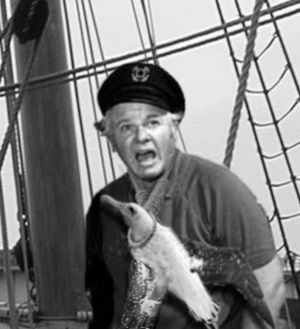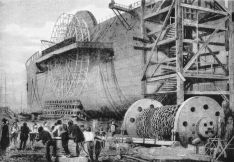The Tempest
“I have nothing better to do in the last few years of my life but write about some weirdos on an island!!??”
– Shakespeare on The Tempest play
“Hag-seed, hence!”
– Prospero on your mom
“Ban ban, Ca-Caliban!!”
– Caliban on Caliban
“I was the man in the moon when time was.”
– Stephano on his previous employment
The Tempest was the last play Shakespeare was able to write before his death. Originally intended to be a short poem, a period of sleepwalking and scribbling created a classic but foreboding tale of an old man's quest for vengeance and justice against the men who made him go on vacation against his will.
Characters[edit | edit source]
- Prospero - The wise man who lives on a subtropical island near Italy. He has been expelled as the Duke of Milan by his brothers and constantly complains of his tragic plight, having been deprived of mountains of paperwork and forced to endure the torture of an extended beach holiday. He wishes to return to his home. He refers repeatedly to himself as a 'sorcerer', even though he uses no magic at all, anywhere, in the play. Anywhere.
- Alonso - The self-made King of Italy, he spends most of his time crying, being in a state of mental agitation, and pitying himself. When he is not conquering lands.
- Miranda - Prospero's man-hungry young. Deprived since birth of male company beyond that of her father and the fish-like creature Caliban that serves him, she believes that Ferdinand is so handsome that he must be God, and rushes to marry him within about 5 minutes of their acquaintance. Her purpose in the play is to 1)have her (unexplained) perfection fawned upon by all, 2)have her "virgin-knot" discussed and obsessed-upon by various male characters, 3)listen patiently to her father and Ferdinand, 4)provide the happy-ending wedding, and 5)be a disgrace to womankind. Not that it matters, since she is the only living female in the story.
- Ferdinand - Son of Alonso. Ferdinand. Believes his father to be dead for much of the story, but quickly forgets this little detail when confronted with Miranda's pretty face. Since she is a virgin, he wants to make her Queen of Naples (if she were not, she would fall into his ranks of ladies with "some defect in her" that he liked but not with full soul. But she is. SHE IS!!!).
- Antonio - Considerate brother of Prospero who thought that the work of Duke was too much stress for the latter, and decided to send him on an all-expenses paid permanent vacation while he himself took over the thankless job. Instead of appreciation for this kind gesture though, he receives verbal abuse from his brother when they are reunited.
- Caliban - Slave of Prospero who was once the owner of the island when his old crone mother Sycorax ruled. Referred to as monster/fish/moon-calf by other characters, but really, he's just ugly.
- Stephano - The character that gets drunk all the time.
- Trincolo - Another character that gets drunk all the time.
- Ariel - Spirit who serves as Prospero's servant and only friend. His/her/its gender and mind are constantly in dispute.
- Other Characters - The Captain, Sebastian, Alonso, two plumbers, Alonso, miscellaneous spirits, Mario (one of the plumbers?) , Luigio (one of the plumbers?) , Mirando, Ferdino, Calibo, Arielo, Atoso and Alonso.
Plot Summary[edit | edit source]
Act I[edit | edit source]
The play opens on Alonso's warship as it sails across the Mediterranean on its way to Jamaica.
Onboard is Alonso, the king of a small and smelly principality near Naples. He is accompanied by his cousin Alonso, his father Alonso, his second cousin Alonso, his second cousin twice removed called Alonso, his mother called Alonso, and just about every other person from Italy named Alonso.
Accompanying the traveling party is King Alonso's brother Sebastian, King Alonso's grouchy next-door-neighbor Antonio; King Alonso's son Ferdinand, and two Italian plumbers.
Alonso begins the play's dialogue by accusing his son Ferdinand of being illegitimate because his name is not Alonso. In response, Ferdinand argues that following that logic, Sebastian must also be illegitimate because he is not called Alonso either.
The ship is governed by the Captain, who is named 'Captain', and has only three lines in the entire play
- "That's a tempest!"
- "That's a really BIG tempest!"
- "I DIE. Oh well. I'll just have some rum toddy."
As this party sails across the ocean, happily planning the conquest and enslavement of Jamaica, they are overtaken by a large evil storm. This storm is known as La Tempesta in Italian, whilst it's just called Big Muthafrickin' Storm in England. As the Captain alerts everyone to the fact that they are in a storm (using his only lines in the play), the ship is completely destroyed by gigantic waves. The passengers are thrown into the sea, and it is implied that they all have drowned.
Act II[edit | edit source]
Meanwhile, on a nearby island, an old man called Prospero contemplates the scenery: sand, hermit crabs, palm trees, and -- in the distance -- a tempest violently abusing a ship. He tries to perform some children's card game tricks, but fails.
Suddenly Prospero's daughter, Miranda, runs up to him and crouches near his feet, groveling on the sand. She pleads with her father, asking him to let her leave the island so she can join an indie rock band.
- Miranda:
- Oh Father, do not force me to waste the springtime of my youth amongst sand fleas and coconuts.
- Prospero:
- Sweet my daughter, shut your gob. Dost thou see yon dark-browed storm upon the ocean's face?
- Just now I have conjured it; the storm of my wrath shall sink a ship
- filled with Alonsos and Eye-tie plumbers. And my visionary eye
- reveals my brother also upon yon boat. That bastard owes me fifty florins.
- Yet I do not recall the name of this brother of mine,
- only that his name not be of Alonso.
- Miranda (amazed):
- Thou hast conjured yon dark-browed storm upon the ocean's face?
- Prospero:
- Yes, that's what I just said. Either that or it's a consequence of global warming.
- Miranda:
Prospero, exhausted by speaking in blank verse, falls asleep for a minute. He wakes up shouting about bananas, and finds Miranda going through his pockets for loose change. He uses his elite powers to put Miranda to sleep.
Prospero then summons his magical imaginary friend, Ariel the little mermaid, and the monster Caliban. Prospero reveals that he had ordered Ariel to destroy the ship with the tempest, and thus kill all onboard. Ariel, however, complains to her master.
- Ariel:
- Lowly natured sprite am I, creature of magic, without the strength to kill.
- Too much you ask, O Master! I am too weak, lowly sprite that I am.
- Caliban:
- You've got nice naughts, though, love. (cackle)
- Prospero (grabbing a palm branch and whacking Ariel):
- Accurséd sprite! Take that! And that! Now exeunt,
- and bring before me those unfortunate creatures you cannot kill.
- Idiot though thou art, I have further need of thee in my masterful plan.
- And you, mooncalf monster, fetcheth me another bottle of Guiness.
- I feel a yearning to feign quaff a pint and take a nap.
Next, Ferdinand is seen washed up on a shore of the island, clinging to the wreckage of the ship's toilet. He passes out, then wakes to find himself magically clothed like a character from a cartoon film about a mermaid. Shuddering, Ferdinand rips off parts of the offending garment and wanders around the island. Ariel flits among the palm trees, luring him on. Suddenly Ferdinand stumbles into the napping Prospero. Ferdinand wakes the old man up by slapping him about (as you do with old people).
Thinking that the naked man before him is his brother, Prospero berates Ferdinand for exiling him to the island and not repaying him the fifty florins he owed.
- Prospero:
- Brother! Slap me about, will you, you vile beast? Thou art a vile thing.
- Would that our mother had borne a whelp more considerate and kind.
- But since you stand here, unslain, pay now the florins you have owed me
- ever since that night we got puking drunk at the Frog's Bum Pub.
- Ferdinand:
- I am not your brother, you graybeard loon. Get a life.
- Prospero, looking closely at the naked Ferdinand:
- Odds bodkins...your maleness looks just like his. Never mind.
- My prisoner now you are, chained fast by my magical arts.
Prospero then chains Ferdinand to a post saying that until he receives 100% of the compensation, he will remain on the island. The audience is instructed to 'boo' at Ferdinand at this point for being a lousy chiseler.
Act III[edit | edit source]
Alonso the king, the other Alonsos, Sebastian and Antonio all wash up together on a different part of the island. King Alonso claims the island in the name of Italy, as all Italians like to do (remember The Spanish Inquisition!!), and starts to build a sandcastle with all the other Alonsos.
- King Alonso:
- Huzzah, my brethren! Behold, as we conquer this pathetic land of the sand and crab
- In the name of all hope and glory that is Italia! Vive le Italia! Wait, that's not right...
- Sebastian (to Antonio):
- This guy's a regular hole of the ass. Let us slaughter him now, with our killing blades,
- before we endure any more of his nuisances.
- Antonio:
- Sweetooth! Awesometh idea. Then I may inherit his throne and use his power
- to conquer all of the seas!
Sebastian and Antonio, being the sadists that they are, kick the sandcastle to pieces and then kill King Alonso, so that Sebastian can become King of Italy. What they do not realise, however, is that they have not killed Alonso the king, but a different Alonso. This is shown by how King Alonso bobs up from the crowds of Alonsos and shouts:
- Alonso:
- Missed me, you blithering nitwits! Ho ho! You are no match
- for the power that is me!
Angry at this jibe, Sebastian and Antonio proceed to cut and kill their way through the crowd of Alonso, in the hope of finally killing the right one.
Ariel is seen watching from a distance, tutting to herself, before walking/swimming off.
Act IV[edit | edit source]
In this scene, the two plumbers of the party are washed up on the island as well. They immediately start chasing and squashing some unsuspecting turtles nearby, before looking for some mushrooms to eat. Ariel appears to the two of them, enticing them to come with her to Prospero. The plumbers, however, begin to prance around Ariel, naming her 'Princess Peach' and trying to stuff her into a tiny 'Princess Peach (sand)Castle'. Ariel is angered by their stupidity, and disappears without a trace. The two plumbers then claim to each other that she has been kidnapped by 'Bowser'. After one of them speaks for a while about looking in an instruction book, the two start running around the island in search of a massive turtle/porcupine hybrid with a huge chin. Unfortunately, the plumbers accidentally run into the character of Caliban, an ugly caveman-like monster. Upon seeing them, Caliban clubs them to death with a club and devours them. The audience is instructed to applaud this.
Next, Ferdinand finally convinces Prospero that he is not his brother through an elaborate conversation that uses a lot of words.
- Ferdinand:
- So see, from this drawing that I place on the sand with this stick,
- that for me to be your brother, and you to be mine,
- then that would place you in the high levels of old age,
- effectively making you excruciatingly old and decrepid. Not to mention smelly.
- Prospero (shocked):
- Ye Gods! You might just be right! For in accusing you of being
- my brother, I am condemming myself to age of the old kind.
Ashamed, Prospero apologises and decides to give him Miranda as a wife. Miranda, who is still asleep, may have had an opinion about this, but nobody cared back in Shakespeare's time. Ferdinand happily grabs her and makes his way behind a coconut tree for some alone time.
Act V[edit | edit source]
Prospero calls Ariel to his side, and demands that she brings all the other tempest survivors to him.
- Prospero:
- Come, my little girl of the mermaid persuasion. The time has come for me to
- deal with the creatures that befoul this accursed island.
- And I'm not talking about the crabs.
- Ariel:
- My Lord, I pray thee, listen to my tale of woe.
- The creatures you so desire to punish are in fact
- being punished themselves, through no fault of your own. Those deemed to be Alonso
- Are being slewn by the hands of two of their crewmembers,
- And the plumbers serve now as food for your slave, Caliban.
- If you so wish me to bring them to you, you would be only doing
- hard work which they are doing for you.
Prospero, thoroughly confused at why plumbers are in this play at all, decides to let everyone go, simply out of the kindness of his heart. He creates a ship for everyone to use to sail to Italy.
And so Prospero, Miranda, King Alonso, and Ferdinand all sail home and live happily ever after, whilst all the rest of the characters are left on the island to DIE.
Evil Laugh
The End.
Criticism[edit | edit source]
As this is the last of Shakespeare's plays, people would have thought that Shakespeare, when nearing the time of his retirement, would like to go out 'with a bang'. Unfortunately, he did not, he wrote The Tempest instead. Critics claimed that it was on a par with A Midsummer Night's Dream; it made no sense, it was full of characters with weird names, and the ending was boring and anti-climatic. Shakespeare told these critics that he really could not be bothered with writing plays anymore, and so he would leave it up to the BBC to make the play sound more interesting.
Critics more familiar with Kill Bill consider it a lousy play because it does not have any ninja fight scenes at all. As New York film critic Elvis Mitchell said:
| “ | "What is this, The Return of Lassie or something? Boy meets sprite? Sheesh. I'm going to watch Alien versus Predator and try to forget this flop. | ” |
The Tempest became criticised as one of Shakespeare's worst plays (even though critics criticize this criticism). Many veteran fans of The Bard explained that Shakespeare's ill health was at fault, because he spent too much time coughing and having headaches and not enough time writing the play properly. Other fans suggested that Shakespeare was forced to write the play in such a way as to put forward his own feelings. Shakespeare himself was unable to comment on these ideas, for he had died shortly after the Tempest was aired in the Globe Theatre.
Although not even remotely as good as some of Shakespeare's works, The Tempest is still considered a 'good' play. Still, teachers still feel that they can torture their students by making them read it and analyze it for homework and exam practice. Many students have dropped English Literature because of this problem, and normally this would be a bad thing. But it isn't, it's a good thing. Now those students can play outside instead of studying this crap.




